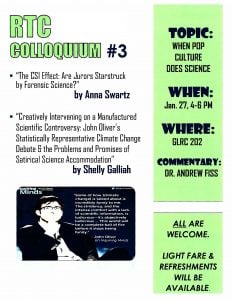 Best-selling author and Michigan Tech humanities alumna Roxane Gay (PhD in Rhetoric and Technical Communication, 2010) has withdrawn a planned book, “How To Be Heard,” from Simon & Schuster, to protest the publisher’s book deal with alt-right provocateur and Breitbart News editor Milo Yiannopolous. The story has been widely covered internationally, in the New York Times, The Washington Post, The Guardian, Salon, Time, Buzzfeed and many other media outlets.
Best-selling author and Michigan Tech humanities alumna Roxane Gay (PhD in Rhetoric and Technical Communication, 2010) has withdrawn a planned book, “How To Be Heard,” from Simon & Schuster, to protest the publisher’s book deal with alt-right provocateur and Breitbart News editor Milo Yiannopolous. The story has been widely covered internationally, in the New York Times, The Washington Post, The Guardian, Salon, Time, Buzzfeed and many other media outlets.
Michigan Tech’s Seventh Annual Green Film Series continues tonight a showing and discussion of the films “After Coal” and “Half Life.” “After Coal,” (60 min.) profiles individuals building a new future in the coalfields of central Appalachia and Wales. Welsh coalfields were shut down in the 1980s, eliminating more than 20,000 jobs while Appalachian coalfields lost more than 20,000 mining jobs from 1994-20014. Both regions have survived disasters associated with mining production & waste disposal, and each has explored strategies for remembering the past while looking to the future. “Half Life: America’s Last Uranium Mill,” (12 min.), describes the Ute tribe’s concern that toxic and radioactive contamination from the White Mesa Mill in SE Utah threatens their water supply and life.
The films begin at 7 p.m. with a discussion facilitated by Roman Sidortsov (SS) to follow. Coffee and dessert will be served. There is no admission but a $3 donation is suggested.
 The Department of Humanities is pleased to announce a Rhetoric, Theory and Culture Colloquium to be held on Friday, January 27 titled “When Pop Culture Does Science.” RTC student Anna Swartz will first present her talk “The CSI Effect: Are Jurors Starstruck by Forensic Science?” followed by RTC student Shelly Galliah presenting “Creatively Intervening on a Manufactured Scientific Controversy: John Oliver’s Statistically Representative Climate Change Debate & the Problems and Promises of Satirical Science Accommodation.” Andrew Fiss will be providing commentary to the presenters.
The Department of Humanities is pleased to announce a Rhetoric, Theory and Culture Colloquium to be held on Friday, January 27 titled “When Pop Culture Does Science.” RTC student Anna Swartz will first present her talk “The CSI Effect: Are Jurors Starstruck by Forensic Science?” followed by RTC student Shelly Galliah presenting “Creatively Intervening on a Manufactured Scientific Controversy: John Oliver’s Statistically Representative Climate Change Debate & the Problems and Promises of Satirical Science Accommodation.” Andrew Fiss will be providing commentary to the presenters.

